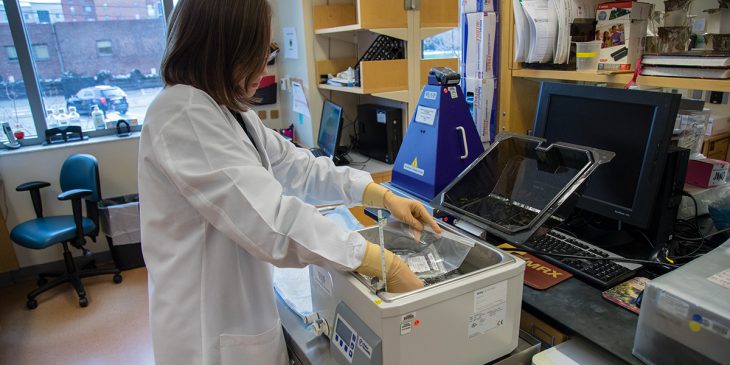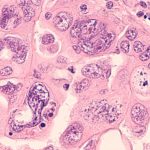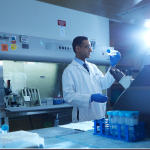“It’s a miracle. It’s just a miracle. I don’t know how else to explain it.”
That’s how Shari Kienzle describes her life today.
Ten months ago, Shari was diagnosed with an aggressive cancer, and chemotherapy was not working. The medical oncology team at UPMC Hillman Cancer Center proposed a newly approved immunotherapy. It would be her last hope for recovery.
In August 2017, after a week at the beach with her family, Shari started to have cold symptoms and thought nothing of it until her back began to ache. When that persisted, the 51-year-old Canonsburg woman decided she needed medical attention.
In September 2017, Shari was admitted to UPMC Shadyside where she was diagnosed with Diffuse large B-cell lymphoma (DLBCL), the most common type of non-Hodgkin’s lymphoma in adults. Her treatment began immediately. After 25 days of chemotherapy, tests showed Shari’s aggressive cancer was not responding and, worse yet, was progressing. The chemo regimen was changed, and last December, it was changed again. The cancer continued to grow.
 Shari’s husband, Paul Kienzle, and their three daughters watched as her health continued to decline. This once active woman, who walked several miles a day, several times a week, was now barely able to walk across her hospital room. While her oncology team investigated the newest cancer therapy that could be her only chance, her family continued to remain positive and relied on their faith, community, family and friends for support.
Shari’s husband, Paul Kienzle, and their three daughters watched as her health continued to decline. This once active woman, who walked several miles a day, several times a week, was now barely able to walk across her hospital room. While her oncology team investigated the newest cancer therapy that could be her only chance, her family continued to remain positive and relied on their faith, community, family and friends for support.
UPMC Hillman Cancer Center is among a select group of cancer centers in the United States to test new immunotherapy treatments in clinical trials. One such treatment, Yescarta™ (axicabtagene ciloleucel) CAR-T cell therapy, went from clinical trial to Food and Drug Administration (FDA) approval in January 2018 for use in patients who have failed at least two conventional treatments. Shari qualified, and the UPMC Hillman Cancer Center oncology team was quickly certified to provide this new treatment because of its successful work in the therapy’s clinical trial phase.
Yescarta™ is made from a patient’s own immune system. It involves extracting a patient’s white blood cells – or T cells – then genetically engineering them to become chimeric antigen receptor T-cells, or CAR-T cells, so they can recognize and destroy cancer cells when they are infused back into the patient. In the clinical trial phase, 51 percent of the patients receiving the treatment showed complete remission, significant odds for an aggressive cancer. But, for 49 percent, the therapy did not work.
On April 2, Shari began this new immunotherapy treatment. Exhausted from the chemotherapy treatments and progressing cancer, her T cells were removed and sent to a lab where they were modified so they would finally be able to recognize and attack her cancer cells. One month later, that process was complete, and the new cells were infused back into Shari’s body to do their work. It was not an easy process. She suffered severe side effects from the therapy, was in a coma for four days and spent a few weeks in intensive care at UPMC Shadyside. Slowly, Shari showed small signs of recovery.
Exactly 30 days after the infusion, Shari was scheduled for a PET-CT scan, a test used to find cancer. It would show whether the immunotherapy worked. The Kienzle family, as well as the UPMC Hillman Cancer Center oncology team, were all hopeful.
The scans showed complete remission. This was Shari’s miracle.
UPMC Hillman Cancer Center now offers two types of FDA-approved CAR-T-cell therapy. Yescarta™ is approved for adult patients with certain types of B-cell lymphoma, which include DLBCL, primary mediastinal B-cell lymphoma, high grade B-cell lymphoma and DLBCL that results from follicular lymphoma. In May of 2018, the FDA approved another CAR-T-cell therapy called Kymriah™ (tisagenlecleucel) for adults with relapsed or refractory DLBCL and adolescent patients up to age 25 with relapsed or refractory acute lymphoblastic leukemia (ALL).
CAR-T-cell therapy is highly specialized and requires a multidisciplinary team of experts working closely together at each step of the process. The UPMC team evaluates each potential candidate to qualify them for this new immunotherapy. They are also conducting clinical trials on other therapies and developing new cancer treatments in the labs, located adjacent to the clinical areas in UPMC Hillman Cancer Center.
Shari continues to undergo testing on a regular basis, and her cancer remains in remission.
Her summer has been full of milestones including her daughter’s high school graduation, walking with her husband and dogs a little further on each outing and working her way back to her career as the human resource director for the Newton Family of Companies.








